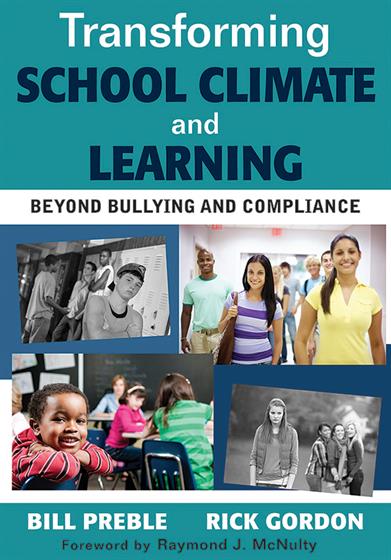Transforming School Climate and Learning
Foreword by Raymond J. McNulty
The authors provide a collaborative action research process to help all stakeholders transform both their school climate and student learning. Includes success stories, strategies, and implementation activities.
- Grade Level: K-12
- ISBN: 9781412992688
- Published By: Corwin
- Year: 2011
- Page Count: 184
- Publication date: August 02, 2011
Review Copies
Description
Creating safe schools from the inside out
This book details a comprehensive process for empowering students and teachers as school improvement leaders and "experts." Bill Preble and Rick Gordon explain how schools can use the SafeMeasures™ collaborative action research process to:
- Collect and analyze school climate data
- Develop improvement goals
- Create exciting and inspiring action plans to dramatically improve their school's climate and student engagement
Each chapter features success stories from real schools, strategies and implementation activities, and book study questions that help all stakeholders transform both their school climate and student learning.
Key features
- Organized around the practitioner-friendly, field-tested, Safe Measures School Improvement process—a 5- stage, collaborative, action-research process involving: 1)establishment of a design team for school improvement that includes teachers and students; 2) collecting and analyzing quantitative and qualitative school climate data; 3) using data to develop school climate and learning improvement goals; 4) developing a powerful school improvement culture that will dramatically change school climate and student engagement in learning; and 5) using formative assessment for continuous improvement and for sustaining school climate improvement.
- Developed as a practical guide for implementing and using the Safe Measures Process, each chapter provides the practical and theoretical elements of each stage of the model, offers personal and practical success stories of each stage of the process in action in real schools ('Making It Real,'), includes an Activity that will provide detailed guidelines for implementation, and concludes with book study questions that can help frame and guide implementation efforts.
- Emphasizes student leadership, a value-added element that enhances teacher and administrator "buy-in" to the process of rethinking and improving educational programs, and develops the leadership potential and civic engagement of their students as partners in school reform.
- "Resources" at the end of the book will include additional tools, samples of planning forms, and other materials to help implement this process.
Author(s)

Bill Preble
Bill earned an EdD from the University of Maine in Curriculum & Instruction and Youth Political Socialization and his MEd in Social Studies Education from the University of Washington. Bill is a Professor of Education at New England College in Henniker, NH where he teaches graduate and undergraduate courses in Educational Psychology, Curriculum and Instruction, Educational Leadership, and School Climate Research, Leadership, and Facilitation.
He created Main Street Academix in 2001 and founded The Center for School Climate and Learning in 2010. These centers provide school climate research and evaluation services and professional development on school climate leadership to schools and state departments of education throughout the country. Bill and his colleagues offer schools on-site school climate improvement services and support for implementation of the SafeMeasures™ Process: which offers a systemic, data-driven approach to preventing bullying and improving school climate and learning.
Bill has made hundreds of presentations on his research and school climate work at schools and professional conferences. He is the co-author of two books, Beyond Bullying…Beyond Compliance: Transforming School Climate and Learning (2011) Corwin Press, and the Respectful School: How Educators and Students Can Conquer Hate and Harassment, with Stephen Wessler (ASCD, 2003) and several articles on school climate leadership and bullying prevention.

Rick Gordon
Rick Gordon has a PhD. in Social and Multicultural Foundations of Education from the University of Colorado-Boulder, a MEd. from University of Minnesota in Political Science with a Focus on Organizational Theory and Public Policy and graduated from Stanford University with honors in Political Science. He was Founding Director of Compass School, a grade 7-12 school that has scored highest on a national survey on Respect, Safety, and School Climate. Rick co-directed The Critical Skills-Education by Design Program at Antioch New England Graduate School, where he also was on the Education Department faculty, and has worked extensively with schools and higher education on Service Learning (including editing the well received Problem Based Service Learning Fieldguide:Making a Difference in Higher Education). Rick has been a Humanities teacher, run several small businesses, and had the honor of visiting thousands of classrooms as an educational ethnographer and consultant over the years. He continues to be involved in teacher development and teaches courses in School Leadership in various locales. Rick has long experience in Experiential Education with Outward Bound and Interlocken, and has traveled extensively around the globe leading programs for youth. Rick played college soccer, and continues his commitment to learning through sports as a coach of youth soccer and nordic skiing.
Table of Contents
Foreword by Raymond J. McNulty
Acknowledgments
About the Authors
Introduction: Bringing Our Schools Into Balance
Beyond Bullying, Beyond Compliance
Getting Beyond Piecemeal Problem Solving
The Rational for This Book: School Climate as a Key to School Safety, Student Motivation, and Academic Achievement
Guideposts for School Leaders: Administrators, Teachers, AND Students
Organization of the Book
Why Read This Book?
Students and Teachers as Partners in Transforming School Climate
1. School Climate: The Heart and Soul of a School
Making Meaningful Improvement in Schools
Why Is School Climate Important?
School Climate and Effective Schools
Essential School Climate Factors
We All Want Respectful Schools
What Teachers and Students Mean by Respect
Beeper Studies: Our Original Research on Respectful Schools
The Respect Continuum: A Practical Theory of Respect
The Disrespect Side of the Continuum
The Respect Side of the Continuum
How Schools Use the Respect Continuum
Initial Success in One District
Looking Beyond Stopping Misbehavior
Making It Real: A Real-Life Respectful School
Conclusion
Book Study Questions
2. The SafeMeasures Process: A Student-Led, Collaborative Action Research Process
Sarason's Research on School Change
Balancing Adult and Student Leadership
The SafeMeasures Process: An Overview
Bandura's Research on Self-Efficacy
Looking Deeply at Collaborative Action Research
Emancipatory Research
Making It Real: School Climate Improvement
Conclusion
Book Study Questions
3. Stage One: Everyone Is a Leader: Empowering Students and Teachers
The Dignity of Expertise
Getting Started
Administrative Support Is Essential
The Adult Design Team: Membership and Roles
National School Climate Standards as a Guide to Action
Selecting a Diverse Team of Student Leaders
Challenges to Choosing a Diverse Team of Student Leaders
Making it Real: Student Leadership Training
Conclusion
Simple Summary: Stage One
Book Study Questions
4. Stage Two: Including All Voices: School Climate Data Collection
The Importance of Data
What Gets Measured Is What Gets Done
Some Potential Problems With School Data Collection
What and How to Measure
What to Do With Data
When Students Become School Climate Researchers
The Power of Qualitative Data
The Value of Quantitative Data
Making It Real: Elementary School Student Researchers
Conclusion
Simple Summary: Stage Two
Book Study Questions
5. Stage Three: Thinking Together: Data Analysis and Goal Setting
Internal or External Locus of Control: Whose Responsibility
Cognitive Dissonance: Wrestling With Data to Construct Meaning
No Fault, No Blame
Words or Numbers? Analyzing Data With Students
Using Quantitative Data Effectively
Goal Setting With Student Leaders
Why Students Lead the Way: Student and Teacher Data Analysis and Goal Setting
Faculty Data Analysis and Goal Setting
The Work of Goal-Based Action Teams
Making It Real: Data Analysis and Goal Setting With Chain Reaction
Conclusion
Simple Summary: Stage Three
Book Study Questions
6. Stage Four: Making Change Happen: Action Planning and Project Development
Action Planning: Where Change Begins
No One Best System
School Climate Action Teams: Working Effectively With Colleagues
Action Planning Steps
Using the Respect Continuum as a Guide to Action
Moving Toward the Positive
Respectful Teaching
Balanced Leadership: Adults and Students Joining Forces for Change
Making It Real: The Backpack Project
Conclusion
Simple Summary: Stage Four
Book Study Questions
7. Stage Four Specifics: Action Projects to Promote Respectful Teaching and Learning
Changing School Climate Through Respectful Teaching
Engagement Strategies That Work
Providing Students With Choices
Authentic, Applied, Real-World Learning
Altering the Schedule to Provide Learning Opportunities
Making It Real: Sugata Mitra's Hole-in-the-Wall Project
Conclusion
Simple Summary: Stage Four Specifics
Book Study Questions
8. Stage Five: Moving Forward Together: Sustainability and Continuous Improvement
Change Is a Process, Not an Event
Key Elements of Sustainable Change
Closing the Gaps
Dignity and Respect
The Best People Working on the Problem
Socially Based and Action-Oriented Change
Enhance, Extend, and Empower
Make a Multiyear Commitment
Formative Assessment: A Critical Part of the Process
Aligning School Climate and Learning: Demonstrate a Balanced Approach
Guideposts for Sustainability
Making It Real: Talking Walls
Conclusion
Simple Summary: Stage Five
Book Study Questions
9. The Road Ahead: Transforming School Climate and Learning
When Will the Time Be Right?
Continued Resistance, Growing Hope
School Climate As a Coherent Framework for Understanding Schools
Implications for School Leaders, Teachers, and Students
Conclusion
Book Study Questions
List of Appendices
Appendix A: From Violence to Empowerment: A Respect Continuum
Appendix B: Sample School Climate Data Summary
Appendix C: Example of Student Goals and Evidence of Need: Elementary School Data (Grades 3–6)
References
Index
Reviews
"The authors clearly illustrate their premises, provide detailed descriptions of their reform procedures, and heroically tackle many facets which are often unaddressed in the educational literature."Cathy A. Patterson, Teacher and Former Assistant Principal
Evergreen Elementary School, Walnut, CA
"I haven’t the slightest hesitation in recommending support for any venture with which Bill Preble is associated. He is a man who challenges conventional wisdom and long may he remain so. Read the book. You will discover what transforming school climate and learning really means and how essential it is to support Bill’s vision.”
Michael Morgan, Former CEO"I haven’t the slightest hesitation in recommending support for any venture with which Bill Preble is associated. He is a man who challenges conventional wisdom and long may he remain so. Read the book. You will discover what transforming school climate and learning really means and how essential it is to support Bill’s vision.”
The Froebel Educational Institute, London, UK
"Preble and Gordon get it that schools are ecological habitats. They recognize students, and everyone in the school environment, as essential to maintaining the school as a dynamic and healthy system. This book - and the student-led, collaborative action research it describes - is an essential waypoint to making any school a humane, effective and sustainable habitat for its students, teachers, and staff."Tom Julius, Director of Academic Assessment
Antioch University New England, Keene, NH
"This is a practical book, it is a resource that teachers and administrators will want to use throughout their careers."Lyne Ssebikindu, Assistant Principal
Crump Elementary School, Memphis, TN
"The topic is very current and the need is great. This will become a great handbook for educators on how to transform school climate."Gary L. Willhite, Professor
University of Wisconsin La Crosse
"The book has a real value. Having gone through a very similar experience of focusing on school climate as a means of improving student learning, I found the points made here to be valid. The authors’ Five-Step process identifies key components. Using data to monitor the results, and committing to the long-haul to achieve the goals are two important pieces in this process. The authors demonstrate that well."Martin J. Hudacs, Superintendent
Solanco School District, Quarryville, PA
"Each chapter contains real-life scenarios; real student, parent, and educator voices; clearly detailed strategies; and pitfalls to avoid. The conclusions are simple, yet powerful. The book’s premise is backed by many years of research."Janie L. Nusser, Superintendent of Schools
South Seneca Central School District, Ovid, NY
Other Titles in: Bullying Prevention | School Change, Reform, & Restructuring | School Culture & Climate

